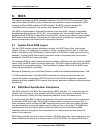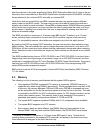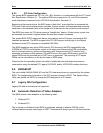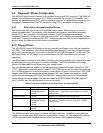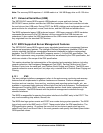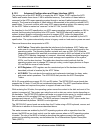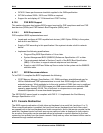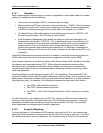
BIOS Intel® Server Board SE7501WV2 TPS
Revision 1.0
Intel reference number C25653-001
78
Note: The recovery BIOS requires a 1.44 MB media in a 1.44 MB floppy drive or LS-120 drive.
6.11 Universal Serial Bus (USB)
The SE7501WV2 server BIOS supports USB keyboard, mouse and boot devices. The
SE7501WV2 server platform contains two USB host controllers. Each host controller includes
the root hub and two USB ports. During POST, the BIOS initializes and configures the root hub
ports and looks for a keyboard, mouse, boot device, and the USB hub and enables them.
The BIOS implements legacy USB keyboard support. USB legacy support in BIOS translates
commands that are sent to the PS/2 devices into the commands that USB devices can
understand. It also makes the USB keystrokes and the USB mouse movements appear as if
they originated from the standard PS/2 devices.
6.12 BIOS Supported Server Management Features
The SE7501WV2 server BIOS supports many standards-based server management features
and several proprietary features. The Intelligent Platform Management Interface (IPMI) is an
industry standard that defines standardized abstracted interfaces to platform management
hardware. The SE7501WV2 server BIOS supports version 1.5 of the IPMI specification. The
BIOS also implements many proprietary features that are allowed by the IPMI specification, but
which are outside of the scope of the IPMI specification.
This section describes the implementation of the standard and proprietary features, including
console redirection, the Emergency Management Port (EMP), Service Partition boot, Direct
Platform Control over the serial port, and Platform Event Paging and Filtering. The BIOS owns
console redirection over a serial port, but plays only a minimal role in Platform Event Paging and
Filtering.
6.12.1 IPMI
The term intelligent platform management refers to the autonomous monitoring and recovery
features that are implemented in platform hardware and firmware. Platform management
functions such as inventory, the event log, monitoring and reporting system health, etc., are
available in a powered down state and without help from the host processors. The Baseboard
Management Controller (BMC) and other controllers perform these tasks independent of the
server processor. The BIOS interacts with the platform management controllers through
standard interfaces.
The BIOS is responsible for opening the system interface to the BMC early in the POST. This
may involve enabling chip selects, decode, etc.
The BIOS also logs system events and POST error codes during system operation. The BIOS
logs a boot event to the BMC early in POST. These events follow the IPMI specification. The
IPMI specification version 1.5 requires the use of all but two bytes in each event log entry,
called Event Data 2 and Event Data 3. An event generator can specify that these bytes contain
OEM-specified values.




